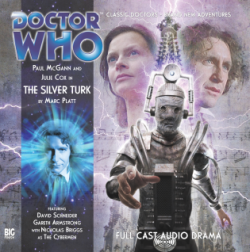
All this became something of a moot point however as pretty much everything anyone could talk about when it was released was the new arrangement of the theme tune. Intended to be evocative of the version used on McGann's one TV showing it sounds like the composer was having an epileptic fit over the keyboard and is the only version of the theme to date to make use of air guitar. I can't quite decide myself if it's delightfully bonkers or deeply irritating, but it has somewhat unfairly distracted from the story itself. Which is something of a shame as it's a good'un.
In Vienna he finds on exhibition the “Silver Turk” (based on the real life Mechanical Turk), run by an obviously deranged man called Stahlbaum. It's supposedly a chess playing automation. Of course, it's really a Cyberman, part of an advanced party from the still century away Mondas. And he wasn't alone. His partner is with another deranged human, Doctor Drossel, and performing some very nasty murders in order to steal people's eyes. For the despite Drossel thinking he's in charge he's actually under the damaged Cyberman's mental influence, and the eyes are going to be used to add realism to the wood carved replicas of real people... Yes, it's completely daft but for a change in Doctor Who this actually makes sense as both the Cybermen are in a very sorry state indeed (with the one even thinking Earth is Mondas) and this has taken its toll on their human keepers, all the antagonists in this story are basically batshit insane.
Now, with what are basically reanimated corpses running about and Mary Shelly present it's hardly surprising this has more than a whiff of Frankenstein about it. Complete with lightening being used to revive a Cyberman and “It's alive!” moment. This is the weakest part of the play, partly because it makes Mary seem far less the literary genius who wound up inventing a whole genre that the play would otherwise have you think, but mostly because the aforementioned Mary's Story already did the “Secret origin of Frankenstein” thing (complete with lightening and “It's alive!” moment). It's probably lucky she's only really remembered for the one book, as a series of adventures of her ironically running into events that echo what she'll write would become boring very quickly.
On the other had though, Mary's characterisation is extremely well handled. As the play goes on, she begins to succumb badly to culture shock as she realises the full implications of being pulled out of time and into conflicts with aliens, even panicking and running away at one point. This is fairly unprecedented in the behaviour of new companions, and winds up feeling both fresh but at the same time very real and human. Julie Cox is brilliant in the role, bringing both strength and a certain brittleness to it. Coupled with an on form McGann and you have an extremely engaging new Tardis team to take us to the start of 2012.
By Marc Platt's high standards the plot is somewhat pedestrian, you know Mary's bond with the one Cyberman won't end well and his ultimate goal to ditch his human lackeys and re-establish contact with Mondas is actually less interesting than the wooden doppelgänger stuff. Stahlbaum and his ex-girlfriend the Countess aren't very engaging characters either, with the later weirdly coming across as if she's hiding something and/or may be evil several times but without any pay off.
However, as an exercise in mood, it manages to overcome those shortfalls. The atmosphere is nicely created by the sound design, and the other characters (which also include a lovable cab driver) are entertaining, with Drossel being endearingly over the top. Nick Briggs could play the Cybermen in his sleep at this point, and perfectly recreates the original Cybermen voices, and manages to add just the right amount of panic and confusion to his performances as the two straggles. Whilst it's arguably light, frothy stuff (despite the brutal murders) it's entertainingly so.
[Four Turkish Delights out of five].
 RSS Feed
RSS Feed
